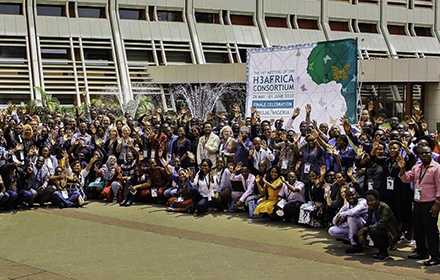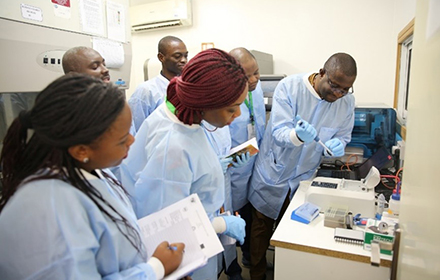By Lauren Sprouse

The Human Heredity and Health in Africa (H3Africa) consortium - a 10-year-long international effort to study the genetic basis of disease among African populations - is evolving. A partnership between NIH, the Wellcome Trust , and the African Academy of Sciences , H3Africa facilitated the development of infrastructure, resources, training, and ethical guidelines to support sustainable genomics research across the continent.
"Before H3Africa, many African countries had limited access to cutting-edge genomic technologies," said Kimberly McAllister, Ph.D., a health scientist administrator in the NIEHS Genes, Environment, and Health Branch. "Now, multiple African countries have the necessary research infrastructure to take full advantage of all the applications of the genomic revolution in medicine."
"To complement the impressive accomplishments in genomic research infrastructure and productivity, NIEHS involvement has focused on enhancing and expanding the environmental health research capacity in H3Africa," said Bonnie Joubert, Ph.D., a health scientist administrator in the NIEHS Population Health Branch.
McAllister and Joubert represent NIEHS as part of H3Africa's Environmental Health Working Group , one of many working groups that helped guide the program by developing research tools and informing program policies and guidelines. By co-funding projects and hosting workshops and webinars, NIEHS supported research into how exposures to environmental contaminants - such as pesticides, air pollution, and metals - factor into disease.
As NIH Common Fund support for H3Africa concludes, NIEHS staff involved in the NIH consortium reflect on several feats and milestones as ways to continue support are considered.
Enduring Accomplishments

The consortium supported over 51 projects in 30 African countries, and more than 650 publications have come from the program.
Among H3Africa's greatest accomplishments, according to McAllister, is the establishment of three biorepositories - facilities that collect and store DNA samples - in Uganda, South Africa, and Nigeria. The H3Africa Biorepository Program held a showcase in June 2022 to share details about the facilities' current projects, storage capacities, and sample processing and sequencing capabilities. With state-of-the-art equipment and well-trained staff, the biorepositories make biological and environmental specimens available to researchers for new discoveries.
"A huge accomplishment is the capacity to store environmental samples as well as analyze biomarkers of environmental exposures in African laboratories," Joubert said. "Historically, the highly technical lab assessments have been completed outside of Africa. Now, having African-based expertise will enable more research, save cost, and continue to deepen strong research and biorepository capacities."
The Pan African Bioinformatics Network (H3ABioNet) also grew out of H3Africa. The network supports the development of methods and tools - including computer programs, platforms, and databases - to capture and interpret biological data.
"Generating high-quality data on diverse African populations has been extremely valuable to not just African populations, but global populations as well, because there is an abundance of genetic variants in Africa populations that are rare or absent in the rest of the world," McAllister explained.
H3ABioNet has also been instrumental in preparing new scientists. The network hosts face-to-face workshops and online trainings that contribute to the development of genomics expertise among African scientists. While hundreds of graduate and postdoctoral investigators trained within H3Africa research projects, thousands more learned through H3ABioNet distance learning courses.
When the pandemic struck, H3African scientists also led efforts for the African response to COVID-19, including sequencing the first African SARS-CoV-2 virus genome . With leadership from the Network for Genomic Surveillance in South Africa, H3Africa supported research to identify and characterize the omicron variant as well.
Future Directions
H3Africa largely succeeded in meeting its original goals, including the creation of sustainable research programs. To that end, many H3Africa investigators have secured funding to continue their work.
The consortium's success also inspired a new NIH program, Harnessing Data Science for Health Discovery and Innovation in Africa (DS-I Africa). The program will leverage data science technologies and prior NIH investments, including infrastructure developed through H3Africa, to help solve the continent's urgent public health challenges. It will also devote resources to investigating ethical, legal, and social ramifications of data science research.
By establishing research hubs and increasing training opportunities, the program plans to expand the network of scientists dedicated to African health.


